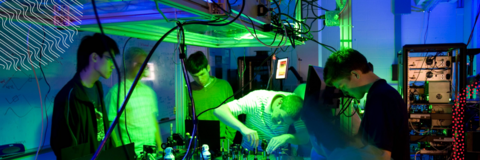The Institute for Quantum Computing offers an interdisciplinary graduate program in Quantum Information (QI) that leads to MMath, MSc, MASc, and PhD degrees.
The graduate program is designed to provide knowledge of quantum information, including theory and implementations, their home program discipline, and also develop advanced expertise in their particular research area within quantum information.
Students are required to complete the requirements of both their home unit and the specific requirements of the Quantum Information (QI) program to achieve the special QI designation.
The Quantum Information program is offered in collaboration with:
Discover our Quantum Information (QI) Programs
Supplemental training program
CryptoWorks21 is a supplemental training program for graduate students and postdoctoral fellows who would like to develop their technical and professional skills for a successful career in cybersecurity, quantum, and related areas. It is a joint program between the Institute for Quantum Computing and the Cybersecurity and Privacy Institute (CPI).
First-year graduate students and new post-docs in CPI and IQC are especially encouraged to participate in the program.
To get more information on the CryptoWorks21 program in general, please visit the CryptoWorks21 website.
